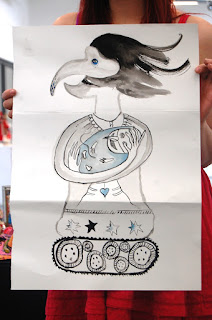It seems obvious to emphasize
how important the visual nature of
the dream is. However, this might be the reason that the major work of Sigmund
Freud, The Interpretation of Dreams
(1900), had such a big impact on modern art, even greater than in psychiatry
and psychology, at least in the
early stages.
Although Surrealism emerged as
a literary movement inspired by Freud’s theories of the unconscious,
nineteenth-century mysticism and Symbolist art and literature, almost at the
same time, the movement’s proponents realized the potential of the visual arts
to express the imagery of dreams and the unconscious mind. So the practice of
drawing, which offers the advantages of immediacy and spontaneity, became the
most fertile medium of expression and innovation among the Surrealists.
It also seems obvious to
reject the naive and clichéd affirmation that the Surrealist artists “copy”
their dreams in their works. Max Ernst complained about it in his text What is Surrealism?(1934), but it is
still too common even today.
For them, the dream is what
might be termed life’s other fifty percent, a level of experience different
from conscious life, the knowledge and liberation of which impinges in a
special way on the enrichment and amplification of mental life, which
constitutes the Surrealists’ main objective.
They used, in their efforts to
bypass the conscious mind and access the subliminal realm, diverse drawing
techniques like automatic drawing,
frottage, decalcomania, collage, grattage, but some of the most striking
surrealist drawings were the “exquisite corpses”.
The “exquisite corpse” is a
surrealist game that involved collaboration and chance. It is a method by which
a collection of words or images is collectively assembled and is similar to an
old parlour game called Consequences.
The technique got its name from results obtained in initially by playing: “Le
cadaver/exquis/boira/le vin/nouveau” (The exquisite corpse will drink the young
wine). Other examples are: “The dormitory of friable little girls puts the
odious box right” and “The Senegal oyster will eat the tricolor bread”. These
poetic fragments seemed to reveal the unconscious reality in the personality of
the group, resulting from a process of what Ernst called “mental contagion”. It
was natural that such oracular truths should be similarly sought through images,
and the game was immediately adapted to drawing by assigning a section of the
body to each player, though the Surrealist principle of metaphoric displacement
led to images that only vaguely resembled the human form.
Tristan Tzara (1896-1963)
described the rules of the drawing game: “Three (or more) of you sit down
around a table. Each one of you, hiding from the others, draws on a sheet the
upper part of a body, or the attributes able to take its place. Pass on to your
neighbor on the left this sheet, folded so as to conceal the drawing, but for
three or four of its lines passing beyond the fold. Meanwhile, you get from
your neighbor on the right another sheet prepared in the same way (previously
folded perpendicular to the axis of the body to be realized).
André Breton, the founder of
Surrealism, considered that with the exquisite corpse we had at our command an
infallible way of holding the critical intellect in abeyance and fully
liberating the mind’s metaphorical activity.
In my opinion, the exquisite
corpse grasps the atmosphere of the dream in a amazing way, although the
results can be sometimes more grotesque than real dreams. Both the spontaneity
and the nonsense due to the change of one hand to another, make the magic of
the “surreal” arise to its peaks. By the way, it might be an amusing game to
partake in when you are out at the bar with your friends, the only thing you
need is a pen, a piece of paper (a paper napkin, for example) and want to let
fly your imagination. Knowing how to
draw in this particular case is not important, but rather to go into a “surreal adventure”.
Li







No comments:
Post a Comment